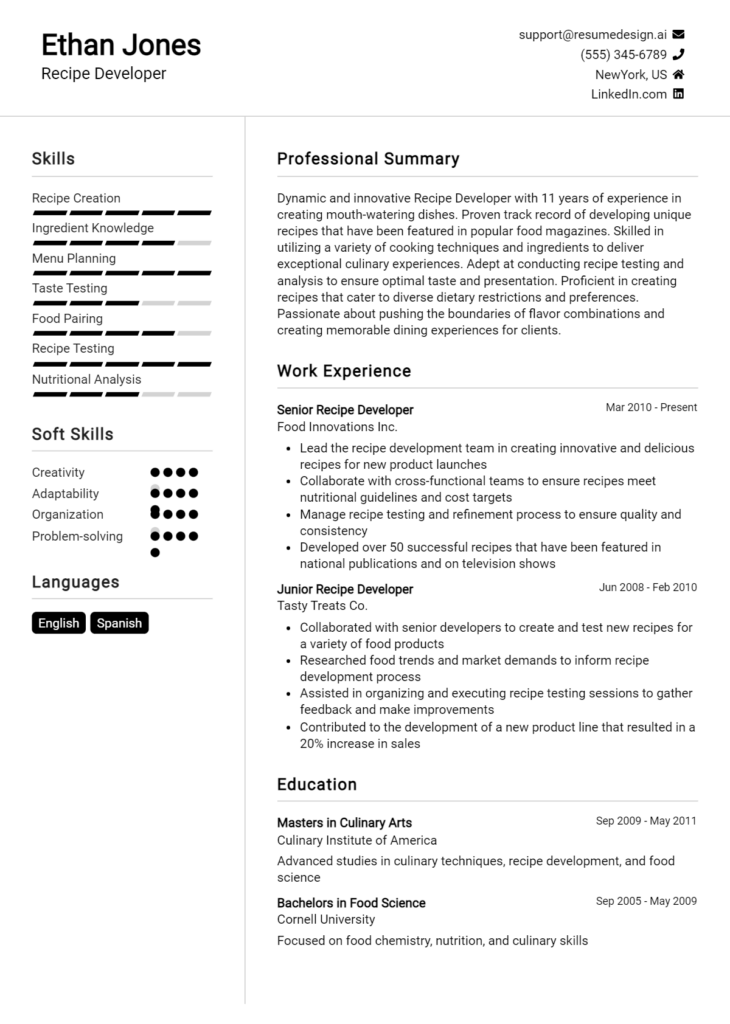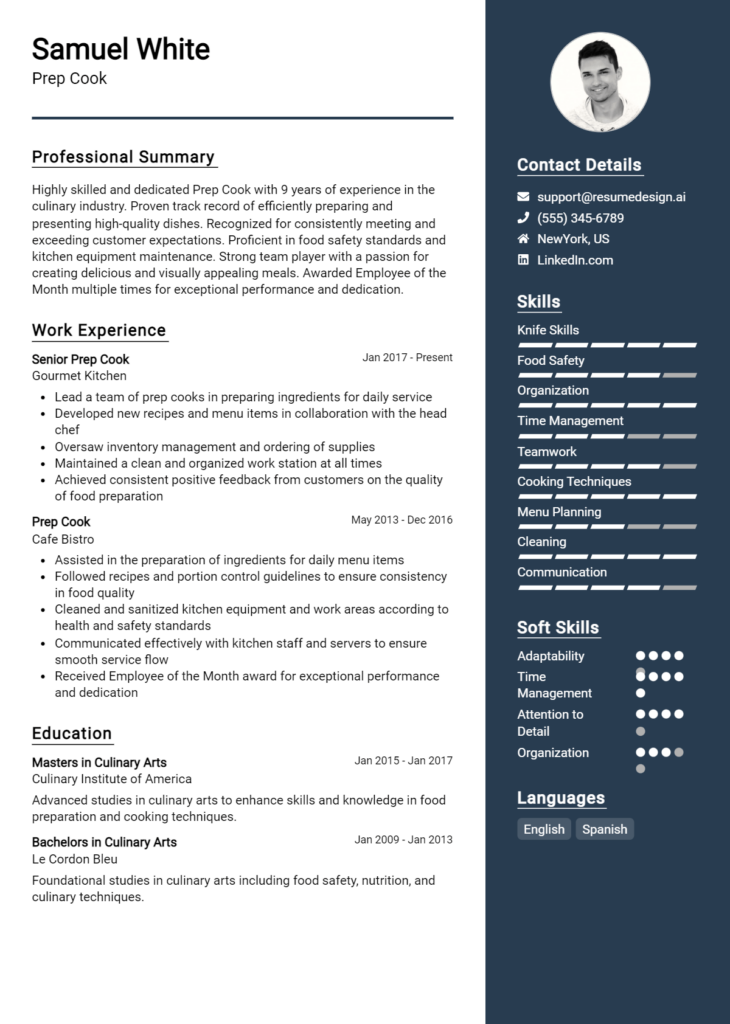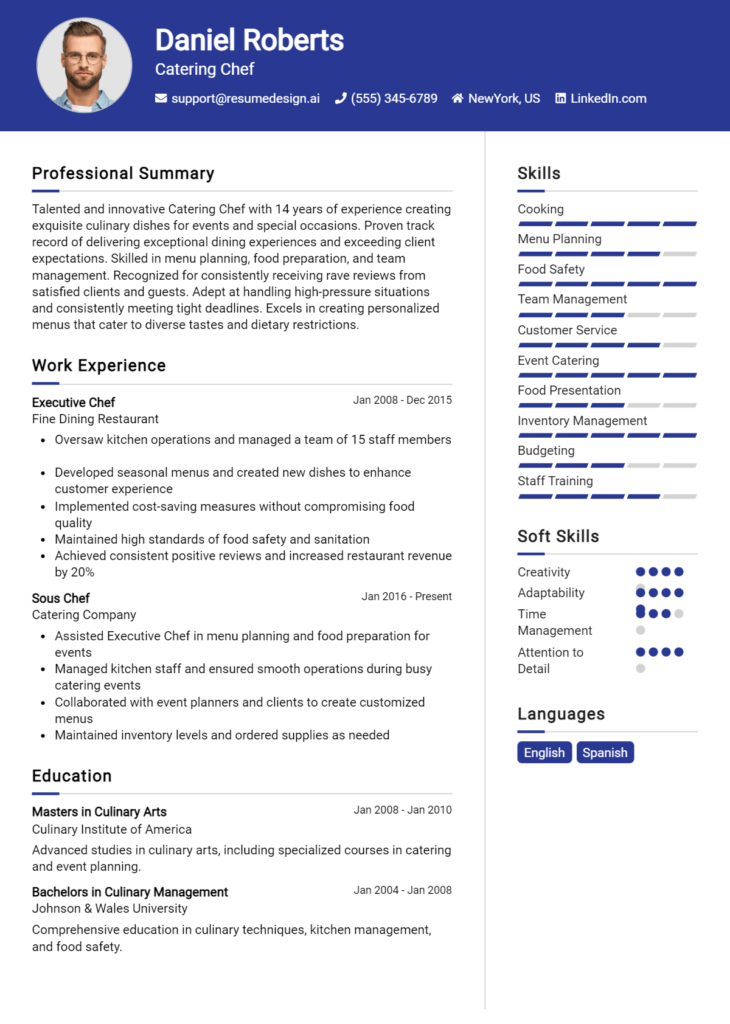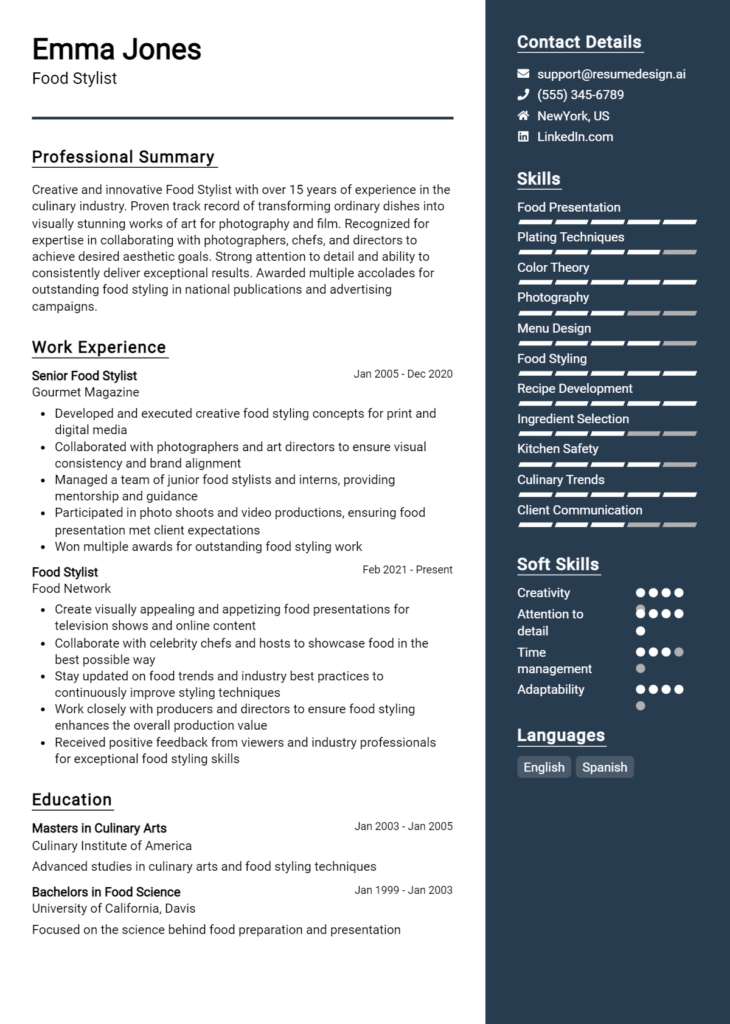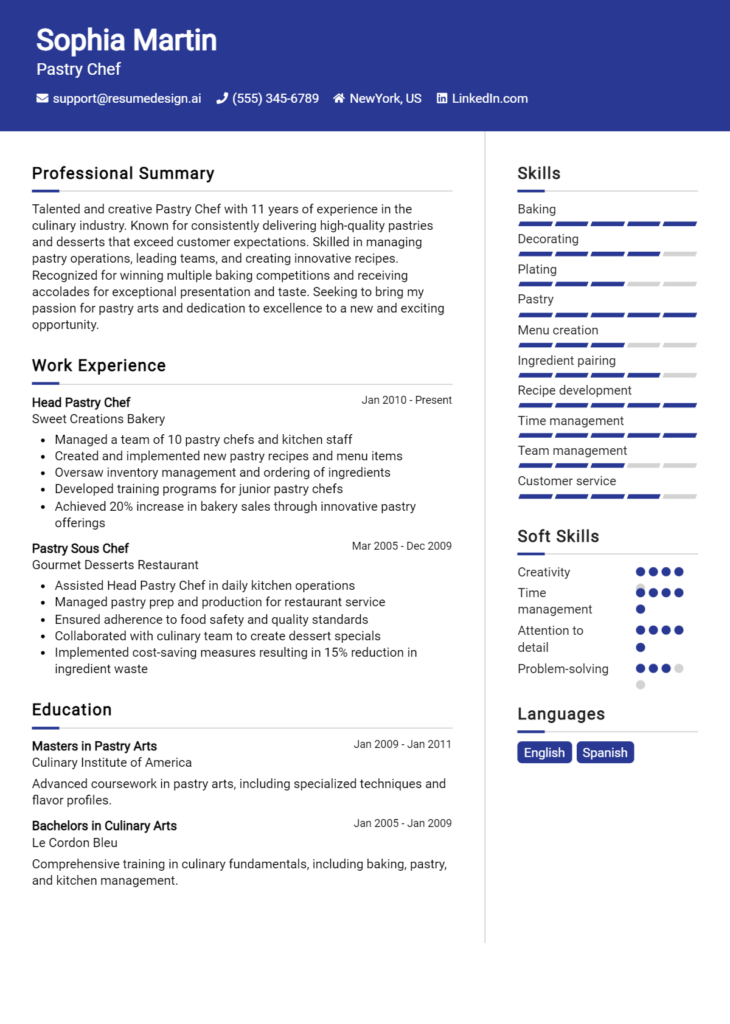Culinary Instructor Core Responsibilities
A Culinary Instructor plays a pivotal role in shaping aspiring chefs by delivering hands-on training and theoretical knowledge in culinary arts. Key responsibilities include developing lesson plans, conducting classes, and ensuring food safety standards are met. Essential skills encompass technical cooking expertise, operational management, and strong problem-solving abilities, which bridge culinary education with organizational goals. A well-structured resume highlighting these competencies can effectively demonstrate a candidate’s qualifications and readiness to contribute to the culinary field.
Common Responsibilities Listed on Culinary Instructor Resume
- Design and implement comprehensive culinary curriculum.
- Conduct hands-on cooking demonstrations and lectures.
- Evaluate student performance and provide constructive feedback.
- Ensure compliance with health and safety regulations.
- Manage kitchen facilities and equipment maintenance.
- Collaborate with other departments for cross-functional training.
- Develop and execute special events or workshops.
- Mentor students in culinary techniques and career paths.
- Stay current with industry trends and innovations.
- Facilitate sourcing and budgeting for culinary supplies.
- Assist in marketing and promoting culinary programs.
- Conduct assessments and modify teaching methods as needed.
High-Level Resume Tips for Culinary Instructor Professionals
In the competitive landscape of culinary education, a well-crafted resume serves as a vital tool for Culinary Instructor professionals seeking to make their mark. Often, the resume is the first impression a candidate leaves on potential employers, and it needs to effectively showcase both their skills and achievements in the culinary arts. A strong resume not only highlights a candidate's culinary expertise but also conveys their teaching abilities and passion for education. This guide will provide practical and actionable resume tips specifically tailored for Culinary Instructor professionals, ensuring that your resume stands out in a crowded field.
Top Resume Tips for Culinary Instructor Professionals
- Tailor your resume to the specific job description by using keywords and phrases found in the job posting.
- Highlight relevant teaching experience, detailing the courses you’ve taught and any culinary programs you’ve developed.
- Quantify your achievements, such as the number of students successfully placed in jobs or awards received for your culinary programs.
- Showcase industry-specific skills, such as knowledge of food safety regulations, kitchen management, and culinary techniques.
- Include certifications and credentials, such as ServSafe, culinary school degrees, or specialty training.
- Demonstrate your ability to create engaging lesson plans and adapt teaching methods to different learning styles.
- List any professional affiliations, such as membership in culinary organizations or participation in workshops and seminars.
- Utilize action verbs to describe your experiences and responsibilities, making your contributions clear and impactful.
- Keep the format clean and professional, using clear headings and bullet points for easy readability.
By implementing these tips, Culinary Instructor professionals can significantly enhance their resumes, increasing their chances of landing a desirable position in the field. A compelling resume not only captures the attention of hiring managers but also effectively communicates a candidate's unique qualifications and passion for culinary education, paving the way for a successful career.
Why Resume Headlines & Titles are Important for Culinary Instructor
In the competitive field of culinary education, a well-crafted resume headline or title plays a pivotal role in capturing the attention of hiring managers. As the first thing that potential employers will see, a strong headline can succinctly summarize a candidate’s key qualifications while setting the tone for the rest of the resume. It should be concise, relevant, and directly related to the specific culinary instructor position being applied for. A compelling headline can serve as a hook, enticing hiring managers to delve deeper into the applicant's experience and skills, thereby increasing the chances of landing an interview.
Best Practices for Crafting Resume Headlines for Culinary Instructor
- Make it concise: Aim for a headline that is no longer than 10 words.
- Be role-specific: Include the job title or specific culinary focus to ensure clarity.
- Highlight key skills: Incorporate essential skills relevant to culinary instruction.
- Use action words: Start with strong action verbs to convey impact.
- Showcase experience: Mention years of experience or notable achievements.
- Tailor to the job description: Customize the headline to reflect the specific requirements of the position.
- Include certifications: If applicable, mention relevant culinary certifications or qualifications.
- Maintain professionalism: Use appropriate language and avoid overly casual phrases.
Example Resume Headlines for Culinary Instructor
Strong Resume Headlines
Innovative Culinary Instructor with 10+ Years of Experience in Fine Dining.
Passionate Culinary Educator Specializing in Farm-to-Table Techniques.
Certified Culinary Instructor Committed to Student Success and Culinary Excellence.
Dynamic Chef and Educator with Expertise in International Cuisine.
Weak Resume Headlines
Culinary Instructor Looking for Opportunities.
Experienced Chef.
Teaching Culinary Skills.
The strong resume headlines are effective because they clearly convey the candidate’s unique strengths, qualifications, and focus areas in a compelling manner. They utilize specific terms and demonstrate a clear alignment with the culinary instructor role, making them memorable and impactful. In contrast, the weak headlines fail to impress due to their vagueness and lack of specificity, leaving hiring managers with little information about the candidate’s qualifications or expertise. A strong headline should not only attract attention but also serve as a powerful introduction to the candidate's professional identity.
Writing an Exceptional Culinary Instructor Resume Summary
A well-crafted resume summary is essential for a Culinary Instructor as it serves as a powerful first impression for hiring managers. In a competitive field where culinary skills and teaching ability are paramount, a strong summary concisely highlights the candidate's key skills, relevant experience, and notable accomplishments. This brief yet impactful introduction can quickly capture the attention of employers, demonstrating the instructor's suitability for the role and their passion for culinary education. Tailoring the summary to the specific job applied for ensures that the candidate aligns their strengths with the needs of the employer, making it a crucial component of an effective resume.
Best Practices for Writing a Culinary Instructor Resume Summary
- Quantify Achievements: Use specific numbers and outcomes to showcase your impact, such as student success rates or class sizes.
- Focus on Relevant Skills: Highlight culinary techniques, teaching methodologies, and any specialized knowledge that relates to the role.
- Tailor for the Job Description: Customize your summary to reflect the specific requirements and responsibilities outlined in the job posting.
- Keep it Concise: Aim for 3-5 sentences that deliver maximum information in a clear and direct manner.
- Showcase Passion and Commitment: Convey your enthusiasm for teaching and your dedication to student success in the culinary field.
- Include Certifications and Qualifications: Mention any relevant credentials that enhance your qualifications as an instructor.
- Use Action Words: Start sentences with strong action verbs that convey confidence and expertise.
- Demonstrate Continuous Learning: Highlight any ongoing education or professional development that showcases your commitment to the culinary arts.
Example Culinary Instructor Resume Summaries
Strong Resume Summaries
Dynamic Culinary Instructor with over 10 years of experience in teaching diverse student populations. Successfully increased student pass rates by 30% through innovative lesson plans and hands-on cooking demonstrations.
Passionate Culinary Educator specializing in Italian cuisine, with a proven track record of organizing successful culinary events that attracted over 500 attendees and raised $10,000 for local charities.
Certified Executive Chef and Culinary Instructor with expertise in baking and pastry arts. Developed a curriculum that improved student retention rates by 25% while fostering a collaborative learning environment.
Experienced Culinary Instructor with a focus on sustainability and farm-to-table practices. Led workshops that educated over 200 students on sustainable cooking, resulting in a 40% increase in student engagement.
Weak Resume Summaries
I am a culinary instructor with some experience in teaching cooking classes and a passion for food.
Culinary professional who enjoys sharing knowledge about cooking and has worked in various kitchens.
The strong resume summaries effectively communicate the candidate's accomplishments and relevant skills, providing specific metrics and clear examples that illustrate their impact in previous roles. In contrast, the weak summaries lack detail and quantifiable results, making them generic and less compelling to potential employers. Strong summaries showcase the candidate's value and suitability for the Culinary Instructor position, while weak summaries fail to engage or inform the hiring manager.
Work Experience Section for Culinary Instructor Resume
The work experience section of a Culinary Instructor resume is a vital component that showcases a candidate's technical skills, leadership abilities, and commitment to delivering high-quality culinary education. This section provides potential employers with insight into the candidate's hands-on experience in culinary arts, their capability to manage and inspire teams, and their success in producing exceptional culinary products. By quantifying achievements and aligning past experiences with industry standards, candidates can effectively demonstrate their value and readiness for the role, making this section critical for standing out in a competitive job market.
Best Practices for Culinary Instructor Work Experience
- Highlight specific culinary techniques and skills relevant to the curriculum.
- Quantify achievements, such as improvements in student performance or program growth.
- Emphasize leadership roles, showcasing experience in managing kitchens or educational teams.
- Include collaboration with industry professionals or partnerships with local businesses.
- Detail curriculum development contributions and innovative teaching methods implemented.
- Reflect on feedback from students or peers to demonstrate effectiveness as an educator.
- Use action verbs to convey a proactive approach in all experiences listed.
- Align work experiences with the latest trends in culinary education and industry demands.
Example Work Experiences for Culinary Instructor
Strong Experiences
- Designed and implemented a farm-to-table curriculum that increased student engagement by 40% and improved course completion rates by 25% over two years.
- Managed a team of 10 culinary students in a high-pressure kitchen environment, achieving a 95% customer satisfaction rating for on-campus dining events.
- Collaborated with local farms to source ingredients, resulting in a 30% reduction in food costs and enriching students’ understanding of sustainable practices.
- Developed and led a workshop series on advanced baking techniques, receiving an average feedback score of 4.8 out of 5 from participants.
Weak Experiences
- Taught various cooking classes to students.
- Worked with some local suppliers for ingredients.
- Helped students learn about food safety and sanitation.
- Participated in team meetings regarding curriculum planning.
The experiences labeled as strong demonstrate measurable outcomes and specific achievements that highlight the candidate's technical expertise and leadership capabilities. In contrast, the weak experiences lack detail and quantifiable results, making them less impactful. They do not provide clear evidence of the candidate's contributions or the effectiveness of their teaching, which diminishes their overall value in the competitive landscape of culinary education.
Certifications and Education for a Culinary Instructor Resume
When crafting a resume for a Culinary Instructor position, it is essential to highlight relevant certifications and educational backgrounds that demonstrate your expertise in culinary arts and teaching. Here are some guidelines and examples to help you effectively list this information.
Certifications:
ServSafe Certification: This is a crucial certification for culinary professionals, as it demonstrates knowledge of food safety and sanitation practices. It's often required by employers and shows your commitment to maintaining hygiene standards in the kitchen.
Certified Culinary Instructor (CCI): Offered by the American Culinary Federation (ACF), this certification is specifically designed for those who wish to teach culinary arts. It validates your skills not only in cooking but also in instructional techniques.
Culinary Arts Degree: While not a certification per se, holding a degree from an accredited culinary school is a strong asset. It provides a solid foundation in culinary techniques and theory, essential for teaching others.
Specialized Certifications: Depending on your area of expertise, consider certifications in specific cuisines (e.g., Italian Culinary Institute) or techniques (e.g., pastry arts, baking and pastry certification). These can set you apart and showcase your diverse skill set.
Educational Background:
Bachelor’s Degree in Culinary Arts: A four-year degree from an accredited culinary institution provides comprehensive training in cooking techniques, culinary theory, and kitchen management, equipping you with the knowledge necessary for instructing students.
Associate Degree in Culinary Arts: A two-year program often focuses on practical skills and culinary fundamentals. This degree is a common requirement for many culinary instructor positions and can be paired with relevant experience.
Bachelor’s Degree in Hospitality Management: This degree emphasizes broader management skills alongside culinary education. It is particularly beneficial for culinary instructors who may also be involved in administrative roles within a culinary program.
Certificate in Adult Education or Teaching: If you have completed courses or certifications that focus on adult education methodologies, be sure to include these. They are valuable for demonstrating your ability to effectively teach and engage students in a culinary setting.
By prioritizing these certifications and educational backgrounds on your resume, you can effectively communicate your qualifications and readiness for a Culinary Instructor role.
Top Skills & Keywords for Culinary Instructor Resume
As a Culinary Instructor, the ability to convey knowledge and inspire students is paramount. A well-crafted resume that highlights relevant skills can make a significant difference in securing an interview and ultimately landing the job. Employers look for a combination of hard and soft skills that demonstrate not only culinary expertise but also the ability to teach, mentor, and engage with students effectively. Crafting a resume that showcases these skills can set you apart from other candidates, making it essential to understand and articulate your competencies in the culinary arts and education.
Top Hard & Soft Skills for Culinary Instructor
Soft Skills
- Strong communication skills
- Patience and empathy
- Leadership and mentorship abilities
- Creativity and innovation in menu planning
- Time management
- Adaptability and flexibility
- Conflict resolution
- Teamwork and collaboration
- Passion for teaching
- Organizational skills
- Cultural sensitivity
- Positive attitude
- Problem-solving skills
- Motivational skills
- Attention to detail
- Customer service orientation
Hard Skills
- Proficiency in various cooking techniques
- Knowledge of food safety regulations
- Culinary arts education and training
- Recipe development
- Menu planning and costing
- Baking and pastry skills
- Nutrition knowledge
- Food presentation skills
- Equipment operation and maintenance
- Knowledge of dietary restrictions
- Inventory management
- Classroom management
- Curriculum development
- Assessment and evaluation methods
- Experience with culinary software
- Familiarity with local and international cuisines
- Event planning and catering skills
For more information on how to effectively highlight your skills and work experience in your culinary instructor resume, consider tailoring your content to reflect what potential employers value the most.
Stand Out with a Winning Culinary Instructor Cover Letter
I am excited to apply for the Culinary Instructor position at [Institution Name], as advertised on [Source]. With over [X years] of experience in culinary arts and a passion for teaching, I am eager to share my knowledge and skills with aspiring chefs. My background includes a degree in Culinary Arts from [University/Institution] and extensive hands-on experience in various culinary settings, from fine dining restaurants to catering services. I believe that my practical experience, combined with my desire to inspire and educate others, makes me a strong candidate for this role.
Throughout my career, I have had the opportunity to teach culinary techniques to diverse groups of students, ranging from beginners to advanced cooks. My teaching philosophy centers on creating a supportive and engaging learning environment, where students can explore their creativity and develop their culinary skills. I incorporate a variety of teaching methods, including hands-on cooking demonstrations, interactive workshops, and collaborative projects, to cater to different learning styles. Additionally, I prioritize food safety, sustainability, and the importance of using fresh, local ingredients, which I believe are essential components of a well-rounded culinary education.
At my previous position at [Previous Institution/Company], I successfully developed and implemented a comprehensive curriculum that included both classic and contemporary cooking techniques. I also organized extracurricular activities, such as cooking competitions and guest chef demonstrations, which enriched the educational experience for my students. I am excited about the possibility of bringing my expertise in curriculum development and my enthusiasm for culinary arts to [Institution Name], where I can help cultivate the next generation of culinary professionals.
Thank you for considering my application. I look forward to the opportunity to discuss how my background, skills, and teaching methods align with the goals of [Institution Name]. I am eager to contribute to your esteemed institution and inspire students to achieve their culinary aspirations. Please feel free to contact me at [Your Phone Number] or [Your Email Address] to arrange a conversation.
Common Mistakes to Avoid in a Culinary Instructor Resume
When crafting a resume for a culinary instructor position, it's essential to showcase not only your culinary skills but also your teaching abilities and passion for education. However, many applicants make common errors that can detract from their qualifications and hinder their chances of landing an interview. Avoiding these pitfalls can significantly improve the effectiveness of your resume, allowing you to stand out in a competitive field. Here are some common mistakes to watch out for:
Neglecting Relevant Experience: Failing to highlight teaching experience or culinary training can leave employers unsure of your qualifications. Ensure you include specific roles and responsibilities related to culinary education.
Using Generic Language: Phrases like "team player" or "hard worker" can come across as clichéd. Instead, use specific examples of your contributions and accomplishments to demonstrate your skills.
Overloading with Culinary Jargon: While it's important to showcase your culinary expertise, using excessive jargon can alienate readers who may not be familiar with all terms. Aim for clarity and accessibility in your language.
Lack of Tailoring: Submitting a one-size-fits-all resume can be detrimental. Tailor your resume to each position by emphasizing the skills and experiences that align with the specific job requirements.
Ignoring Educational Background: Culinary instructors should prioritize their educational qualifications. Omitting relevant degrees or certifications can create gaps in your professional narrative.
Inconsistent Formatting: A cluttered or inconsistent format can make your resume difficult to read. Use clear headings, bullet points, and a professional font to enhance readability.
Forgetting Soft Skills: Culinary instructors need excellent communication and interpersonal skills. Failing to include these soft skills can overlook your ability to connect with students and foster a positive learning environment.
Not Including Achievements: Listing only job duties without highlighting accomplishments can make your resume appear flat. Quantify your achievements where possible, such as improvements in student performance or successful event planning.
Conclusion
In this article, we explored the essential skills and qualifications necessary for a successful career as a Culinary Instructor. Key points included the importance of culinary expertise, effective teaching techniques, and the ability to inspire and motivate students. Additionally, we discussed how practical experience in the culinary field, along with a solid educational background, can significantly enhance your credibility as an instructor.
As you reflect on the insights shared, it's crucial to ensure that your Culinary Instructor resume effectively highlights your unique skills and experiences. Take a moment to review and update your resume, so it aligns with the demands of the culinary education sector.
To assist you in this process, we recommend utilizing various resources available to create an impressive resume. You can explore resume templates to find a style that suits your professional image, use the resume builder for a user-friendly experience in crafting your document, and check out cover letter templates to complement your application with a compelling introduction.
Now is the time to take action and ensure your resume stands out in the competitive field of culinary education!

![14 Culinary Instructor Resume Examples And Templates for 2025 [with Guidance] Resume Example](https://resumedesign.ai/wp-content/uploads/2024/09/Culinary-Instructor-Resume-Example.png)
